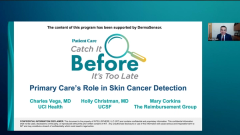
The Evolving Landscape: Integrating Skin Cancer Screening Into Primary Care
Panelists discuss the vital role of primary care providers in early skin cancer detection, highlighting the need for improved diagnostic confidence, integration of artificial intelligence (AI) tools, and efficient workflows to overcome time and resource constraints, ultimately aiming to reduce delays and improve patient outcomes.
Episodes in this series

This session focused on the essential role primary care providers play in the early detection of skin cancer, emphasizing the importance of timely evaluation in improving patient outcomes. The presenters acknowledged that many skin cancers, including melanoma, are first encountered in primary care settings, where time constraints and limited dermatology access can complicate early diagnosis. Recognizing this, the discussion centered on improving diagnostic confidence, utilizing technology such as AI-assisted tools, and integrating efficient workflows to support early identification and referral when necessary.
One major theme was the persistent challenge of balancing thorough skin exams with the realities of busy clinical practice. Polling among participants revealed that many feel only somewhat confident in detecting potentially cancerous lesions, citing lack of time, tools, and diagnostic certainty as key barriers. The panel encouraged the use of image-based learning, open communication with dermatology, and emerging diagnostic technologies to bridge these gaps. Emphasis was placed on preventing both mortality and morbidity, particularly since delays in intervention—even for early-stage melanoma—can significantly impact patient outcomes and recovery.
The session also reviewed data showing that delays in treatment, such as those caused during the COVID-19 pandemic, led to worse surgical outcomes and more advanced disease presentations. Both melanoma and nonmelanoma skin cancers were discussed, with the latter being far more common globally and also capable of serious health impacts when not addressed promptly. Overall, the message was clear: Primary care teams are on the front lines of skin cancer detection and, with the right support and tools, can make a significant difference in identifying concerning lesions before they progress.
Newsletter
Enhance your clinical practice with the Patient Care newsletter, offering the latest evidence-based guidelines, diagnostic insights, and treatment strategies for primary care physicians.

































































































































